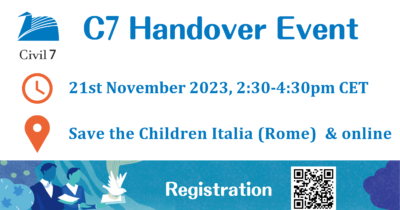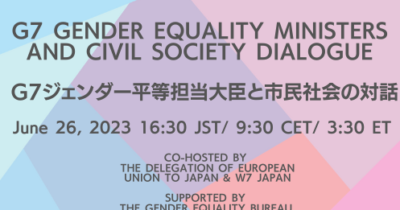The following three members who engaged in C7 Germany held this year came to Japan to hand over the presidency and the whole C7 process to Japan C7.
- Ms. Anke Kurat, Head of Department Global Justice and Sustainable Development, VENRO / C7 Secretariat
- Mr. Wolfgang Obenland, Head of Market Power and Finance, International Financial Policy, German NGO Forum on Environment and Development, C7 Secretariat
- Dr. Dereje Alemayehu, Executive Coordinator, Global Alliance for Tax Justice / C7 Steering Committee
On November 21, after a preparatory meeting with the secretary of the Japan Civil Society Coalition on G7 Summit 2023, they had an exchange of views online with the Development Unit of the Japan Civil Society Network on SDGs, which provided an opportunity to further understand the structure and agenda of the C7.

On the same day, they visited the Non-Governmental Organizations Cooperation Division, International Cooperation Bureau, Ministry of Foreign Affairs of Japan, where they met and exchanged views with Director Toshio Matsuda. The achievements and challenges of the German C7 were shared, and examples of cooperation between the government and NGOs from both Japan and Germany were introduced.

On November 24, the C7 official handover ceremony was held at the venue and online (in cooperation with the World Bank). More than 80 people, including members from other Engagement Groups, attended the event to review the G7 Elmau Summit, discuss expectations for the G7 Hiroshima Summit, and consider the role of civil society. The preparation status of the Japan C7 is also shared, and the communiqué (policy recommendations) of the German C7 was handed over to Japan.
Some comments made during the panel discussion and Q&A session are as follows:
- Because the G7 Elmau Summit did not give much importance on tax and fiscal issues, civil society should have made stronger recommendations; disparities in gender equality and education are getting worse; voices from the Global South are ignored and therefore G7 is the cause, not the solution, of problems.
- I am concerned about the “trivialization of the UN.” The legitimacy of the G7 itself, which is dominated by wealthy countries, should be questioned, and multilateralism should be reinstated. Instead of “helping” developing countries, G7 countries should recognize “the right to development.” As for international taxation, rich countries are setting the rules at their own convenience in the OECD-DAC. The Global South including African countries are calling for an “international solution.”
- The energy crisis needs to be addressed from the perspective of climate change. Energy origin accounts for the largest share of greenhouse gasses. On the other hand, the supply of and access to affordable energy is also a challenge. It is important to make concrete progress on a “fair” energy transition. In addition to carbon dioxide, other greenhouse gasses such as methane and chlorofluorocarbons need to be reduced. Waste management and sustainable agriculture must be promoted. In addition to discussing the “Loss and Damage” Fund, adaptation measures are in need of promotion. We must implement an early warning system to reduce existing disparities and prevent future damage.
- It is of great importance to think about how to prevent disinformation and fake news, as threats to democracy are spreading with the advancement of digital technology. Civil society should promote discussion on the impact of AI and algorithms on individuals.
At the handover ceremony, strong speeches were also delivered from civil society in Hiroshima, the host city of the next G7 Leaders’ Summit, as well as from civil society organizations in other cities holding Ministerial Meetings next year and from other Engagement Groups.
- Ms. Tomoko Watanabe, Executive Director of ANT-Hiroshima, spoke about the significance of holding the G7 Summit in Hiroshima amidst the growing threat of nuclear war in the world, the need for citizens around the world to work together to realize a “world without nuclear weapons,” and the importance of establishing a new working group”Nuclear Disarmament” at the Japan C7 next year.
- Ms. Yoko Shinkai of the Mie NPO Network Center explained the activities conducted by civil society organizations in the Tokai region and throughout Japan in preparation for the G7 Ise-Shima Summit in 2016. She shared her experience of how civil society organizations in the Tokai region of Japan, which had engaged mainly in local issues, collaborated across sectors to make policy recommendations on global issues. She valued that such a process led to strengthening the power of local civil society. She also expressed her wish to continue taking actions while utilizing civil society’s strengths and to convey the significance of civil society’s collaboration toward next year’s G7 Hiroshima Summit.
- In the following video message, Mr. Yoshinori Kurita, Executive Director of the Kansai NGO Council, pointed out that the G7 Summit has become a distant presence for local civil society. He shared that the issues on which local civil society organizations are working are connected to the world and that they can make their voices heard at the G7 Summit, revealing the plan to hold an event in conjunction with the Trade Ministers’ Meeting to be held in Osaka next year.
- Mr. Ryo Saito, Director of the International Policy Division, the Japanese Trade Union Confederation (RENGO), which will be in charge of next year’s L7 (Labor 7) in 2023, explained the prospect main agenda for L7 and his enthusiasm for Japan L7 to be held in Tokyo from April 6 to 7 in 2023.
- Mr. Morita of the Japan Business Federation (Keidanren), which will be responsible for holding B7 (Business 7) in 2023, shared that peace is a prerequisite for promoting economic activities, that the B7 will take decisive action against Russian military actions in Ukraine, and that the B7 is working to rebuild a free and open international economic order.

In the afternoon of the same day, the three members from German C7 met with Mr. Yasuaki Yoneyama, the World Bank’s Special Representative in Japan, and exchanged views on the C7 process, the status of collaboration with other Engagement Groups, and the global activities of the World Bank.
In the evening of November 24, they visited the Ministry of the Environment and met with Ms. Miki Yamada, Vice-Minister of the Environment. Based on the results of COP27 held in Egypt, they exchanged a wide range of views on environmental themes such as energy crisis, greenhouse gas reduction, adaptation measures, coping with loss and damage, and biodiversity conservation, as well as the process and experience of recommendation to the G7 by the German C7. Vice-Minister Yamada commented, “I recognize the role of civil society organizations. However, compared to Germany, the empowerment of civil society organizations in Japan may be lacking. I feel the first step would be to spread this understanding.”

On the following day, they had an informal meeting with the Citizen Participation Promotion Division, Domestic Strategy and Partnership Department of the Japan International Cooperation Agency (JICA). JICA’s efforts were introduced mainly in the areas of climate change and tax & financial flow, and German C7 members asked questions on development issues and Japan’s response toward them.





